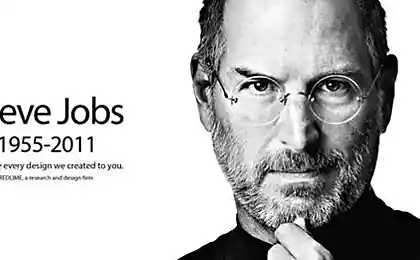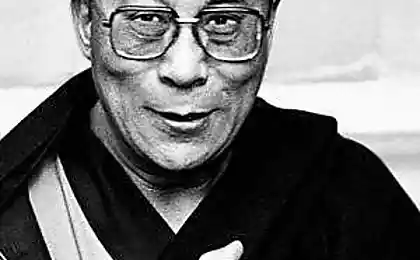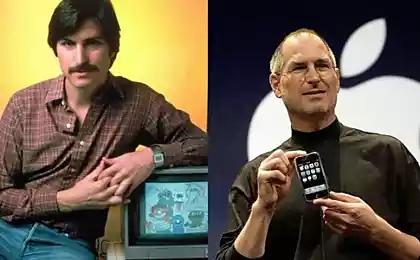472
Not everyone can be Steve jobs

Why Apple overtook Nokia?
The person appointed by the CEO for his management and leadership skills. However, not all leaders in the field of innovative technologies have similar talents. In 2006, Nokia, confidently leading in the market of mobile phones, was appointed CEO Olli-Pekka Kallasvuo. He worked in the company since 1980, and thus had extensive experience in the industry. However, he is a lawyer, a graduate of Helsinki University, worked initially in the legal Department of Nokia, and then in the financial. His professional path is not allowed to lead the creation of new products, and in that period the future of Nokia depend from the successful market launch of innovations.
In the same 2006, Apple has not yet made a single phone. But founder and CEO Steve jobs early in my career constantly oversaw the creation of new high-tech products, and computational performance of the phones has steadily increased and they became more like computers. It would seem that Nokia and Apple it was time to release an innovative phone.
Olli-Pekka Kallasvuo is no exception. The research group of Julia Bystrova in CEAMS, a Swiss management company, investing in enterprises with high development potential, methodically studied the education and careers of the heads of leading American and European companies listed on the stock market. Over the past 20 years, the vast majority of Directors General before taking this position, as a rule, worked for many years in leadership positions in the development and promotion of product lines in the industry. But only about half of them had higher education. In the high-tech industry to guide new product development, engineering or mathematics education is more useful than, say, historical. In addition, it is very desirable the successful experience of personal leadership in the promotion of innovative products.
In the biotech sector the picture is even more dramatic: over the past 20 years, only 26% of Directors General had a science degree or medical education and direct work experience in the field of pharmaceutical research and development. Each of the 26% of these Directors had little or no experience of promotion of the product line until, until they become CEO's. So, the current head of Merck, Kenneth Frazier was previously an Advisor for corporate Affairs, Severin Schwan at Roche Finance, Joe Jimenez, who came to Novartis from Heinz — brand Manager, and Robert Bradley from Amgen for most of his career was an investment banker.

In the technology industry, 62% of Directors General have specialized education and experience appropriate to guide the promotion of innovative products. Examples: Satya Nadella (Microsoft), Steve Mollenkopf (Qualcomm), Lisa Su (Advanced Micro Devices) Jen-San Huang (Nvidia). They all have a University degree in engineering and significant experience in developing high-tech products.
In recent decades, technological progress is accelerating, but in the computer industry faster than pharmaceutical. There is great success in getting approval of new drugs by the industry regulators, however, in the 2000-ies of the pharmaceutical companies invested in R & d (research and development) more than 90. the Cost of developing new medicines has risen dramatically: according to some estimates, six times. The main objective of pharmaceutical companies is the reduction of specific costs of developing products. And almost none of the General managers of pharmaceutical companies is not mentioned in the comments of the experts. This is surprising because some of the most successful drugs were developed and brought to market under the leadership of General Directors with extensive medical and marketing experience — for example, Jean-Paul clozel (Actelion), Arthur Levinson (Genentech) and John Martin (Gilead).
Of course, there are exceptions. GlaxoSmithKline recently has a strong research team and successful development of new drugs. Andrew Vitti, head of the company in 2008, he came to the position of chief Director of the marketing Department, not from laboratories. But GSK has organized the work of researchers and developers so that innovations appear with much less control of the management. In the development of medicines the group works closely with the medical companies of a smaller size. Own research Department is divided into many independent from each other departments, zainteresovannye funding of new products (decision of the investment Council, which is composed of company executives and independent Directors). In Novartis CEO Joe Jimenez, who worked not in a laboratory Department, and the independent Chairman of the Board of Directors Joerg Reinhardt, Ph. D., has worked his entire career in the pharmaceutical industry.
The value of the company can enhance not only innovation. Usually in the short term for balance sheet indicators better bargain mergers and acquisitions, as well as drastic cuts in spending. In the long term, innovation is absolutely essential. If the CEO is not enough experience and knowledge to lead the creation and promotion of new products, shareholders should think about the future of their investments.
Serious questions can ask not only pharmaceutical companies: appointed in the last ten years the Director General of high-tech companies, according to experts, have less experience in the management of the development and promotion of new products. Tim cook (Apple) was the production Manager. Mark Hurd and Safra Catz (Oracle) took up their posts recently. Katz, a former financier and heard (and bill McDermott, head of SAP, one of Oracle's main competitors) marketer. Without the innate abilities to the development and promotion of new products CEOs need more resources and innovative approach to the process of innovation management.
Source: insider.pro/EN/article/4911/






















